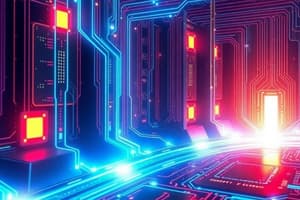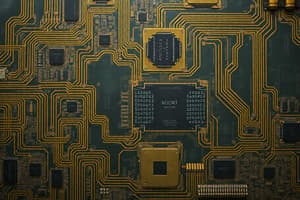Podcast
Questions and Answers
What does computer hardware refer to?
What does computer hardware refer to?
Any physical components of a computer.
Which of the following are internal hardware components? (Select all that apply)
Which of the following are internal hardware components? (Select all that apply)
- Keyboard
- CPU (correct)
- Monitor
- Graphic Card
The CPU is also known as the processor.
The CPU is also known as the processor.
True (A)
What are the four main functions of a processor?
What are the four main functions of a processor?
A processor's speed is measured in terms of ______.
A processor's speed is measured in terms of ______.
What does the Control Unit (CU) do?
What does the Control Unit (CU) do?
What is the function of the Arithmetic Logic Unit (ALU)?
What is the function of the Arithmetic Logic Unit (ALU)?
Which type of processor is designed to control mechanical and electrical functions?
Which type of processor is designed to control mechanical and electrical functions?
A microprocessor can control input and output devices.
A microprocessor can control input and output devices.
What is a Digital Signal Processor (DSP) used for?
What is a Digital Signal Processor (DSP) used for?
Flashcards are hidden until you start studying
Study Notes
Introduction to Hardware Devices
- Computer hardware refers to any physical components of a computer.
- Hardware includes both internal and external components.
- Internal components are essential for the computer's operation.
- External components are attached to enhance functionality.
Central Processing Unit (CPU)
- The CPU is considered the brain of the computer.
- It is responsible for interpreting and executing instructions.
- The CPU performs key operations:
- Arithmetic
- Logic
- I/O operations
- Command allocation for other components
Processor
- Processors are small silicon chips that perform operations.
- Processor speed is measured in megahertz.
- The four main functions of the processor are:
- Fetching instructions
- Decoding instructions
- Executing instructions
- Writing back results
- Processors are found in various devices, including computers, laptops, smartphones, and embedded systems.
Processor Architecture
- Processors are comprised of integrated hardware components.
- These components work together to deliver information and complete tasks.
- Two key factors influence processing speed:
- Processor cores: Determine the amount of information received at once.
- Clock speed: Determines how quickly information is processed.
CPU Components
- Arithmetic Logic Unit (ALU): Performs arithmetic and logical operations.
- Arithmetic operations include addition, subtraction, division, and multiplication.
- Logical operations include AND, OR, Equal, less than, greater than.
- Control Unit (CU): Manages and coordinates all computer components.
- It directs the logic unit, memory, and input/output devices.
- Central Processing Unit (CPU): The brain of the computer system.
- Controls all other units.
- Known as the processor.
Types of Processors
- Microcontroller:
- Primary function is reading input and responding to output.
- Known as General Purpose Input Output (GPIO).
- Microprocessor:
- General-purpose processor consisting of:
- A control unit
- ALU
- Registers (scratchpad, control, and status)
- General-purpose processor consisting of:
- Embedded Processor:
- Designed for controlling mechanical and electrical functions.
- Includes components like:
- Processor
- Timer
- Interrupt controller
- Memory (program and data)
- Power supply
- Reset and clock circuits
- Application-specific circuits
- Ports and interfacing circuits
- Digital Signal Processor (DSP):
- Used for measuring, filtering, or compressing digital or analog signals.
- Ideal for real-time applications.
- Media Processor:
- Designed for real-time data processing, particularly for images and videos.
- Applications include voice user interfaces and professional audio.
Microprocessor
- A central processing unit (CPU) serving as the "brain" of a computer or electronic device.
- It is an integrated circuit that performs various operations:
- Arithmetic and logic operations
- Control of input and output devices
- Execution of instructions from memory.
Studying That Suits You
Use AI to generate personalized quizzes and flashcards to suit your learning preferences.




